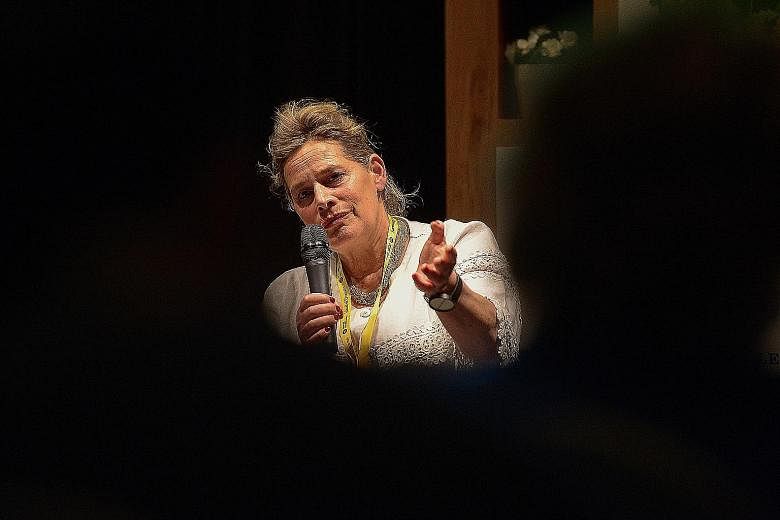Man Booker-nominated British author Deborah Levy recalls her "crushing disappointment" as a child when she realised that the characters in Lewis Carroll's Alice In Wonderland were mere figments of a dream.
" I was hoping to interview Alice, about the White Queen, the Red Queen and Cheshire Cat. Unfortunately, it happened between her ears," said the 56-year-old.
She was speaking to a full-house audience at an hour-long Singapore Writers Festival talk, What Dreams Reveal About Our Secrets And Desires, on Sunday afternoon at The Arts House.
The hazy realm of dreams, which lies beyond human consciousness, throws up the best stories as it reveals truths and feelings we usually avoid, said Levy at the event. She drew on historical examples of how ancient civilisations treated dreams as visits from the divine. The Egyptians developed rituals and "dream beds" to contact the dream world, while the Greeks voyaged to temples to fast and seek interpretations from priests.
"Almost no important work of ancient literature lacks reference to dreams, their interpretation and influence on human attitudes and actions. In a dream, there's always a story we haven't bargained for. Dreams express true feelings, not the ones we're supposed to feel. They give us new eyes for a situation," said the South Africa-born writer.
Her 2012 Man Booker-nominated novel, Swimming Home, opens like a dream and coalesces into a dark, unsettling tale of a family's summer holiday in France gone awry.
Like in the book, Levy imbued her Singapore Writers Festival session with a dream-like quality, addressing her rapt audience in rich dulcet tones, which dipped to a hushed whisper when she read excerpts from her works, such as the short story collection Black Vodka and poetry collection An Amorous Discourse In The Suburbs Of Hell.
As she read, some audience members closed their eyes and swayed their heads, as if lulled into a trance. At times, she would wander off on flights of fancy - "I have learnt that butterflies taste with their feet, ostriches have eyes bigger than their brains and cats have 32 muscles in one ear," she intoned.
The erudite Levy quoted figures such as English writers J.G. Ballard and William Blake, Italian author Italo Calvino, Spanish surrealist painter Salvador Dali and Jewish scholar and psychiatrist Sigmund Freud, who introduced psycho- analysis and dream analysis as therapy for his patients.
She demonstrated one of Freud's most "brilliant, theatrical and performative" explanations of repression, which he likened to a steady knock that one cannot ignore.
Drumming her knuckles on the wooden podium, she said: "We all have thoughts we don't want to think. There's a lot of that in books, that keep us turning the pages. Who is it? What is it?"
Even in the 21st century, dreams, Levy posited, could be "culturally transferable internal conflicts" shared by people divided by geography and language.
She gave the example of how students she had taught in India arrived at the same conclusion as Freud about the Italian artist- engineer Leonardo Da Vinci - that his obsession with flight stemmed from a desire to fly back to his father who abandoned him in his childhood.
"I think of a narrative as a sort of migrant, which can fly through time and borders," she said.
Even a thriller, which follows a classic whodunnit structure, has a correlation to dreams, said Levy.
The joy of reading a thriller comes from piecing together the mystery before the detective does, and dreams do the same for us, she explained. "Dreams get there - wherever 'there' is - before we do, and that's why we should pay attention to them," she said.
Former owner of the bar chain Harry's Holdings Mohan Mulani, 55, who was in the audience, asked Levy for her opinion on the fact that many dreams can be frivolous and meaningless. She agreed and said: "Our dreams are only as important as we make them. You are your own interpreter. You might say, oh, that was a load of rubbish."
Audience member, communications officer Benjamin Moey, 28, who queued for Levy's autograph, said he likes her style of reading.
"She was cool and composed. I found the way she incorporates dreams into stories interesting."
•The Straits Times is the official media partner of the Singapore Writers Festival. For more stories on the festival, go to www.straitstimes.com/tags/singapore-writers-festival-2015


